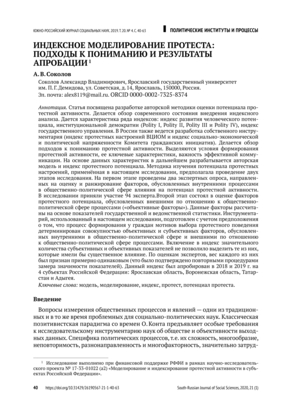Abstract
The paper is aimed at developing original methodology to assess the potential of protest activity. The current state of index analysis implementation in world science is reviewed. The characteristics of a number of indexes is given, which includes human development potential index, institutional democracy (Polity I, Polity II, Polity III and Polity IV) and public administration indexes. Russia is also developing its own tools of index analysis implementation, viz. the index of protest moods on the basis of VTSiOM and the Civil Initiatives Committee socio-economic and political tension index). The article covers a number of approaches to understanding protest activity, as well as highlights conditions for its formation, describes its major characteristics and emphasizes the importance of effective communication. Further, on the basis of these characteristics, the author’s model and the index of protest potential are developed. To study the potential of protest moods, the author employed the methodology that presupposed two stages of the research. The first stage consisted in conducting two expert surveys aimed at assessing and ranking the factors, conditioned by the processes inside) the socio-political sphere of influence on the potential of protest activity 94 experts were involved. The second stage embraced the assessment of the protest potential factors caused by the processes external to the socio-political sphere. These factors were calculated on the basis of state and departmental statistics indicators. The instruments used in this study were selected on the assumption that the process of forming motives for choosing protest behavior in citizens is determined by a combination of objective and subjective factors, conditioned by both internal and external processes in the socio-political. The presence of a large number of subjective and objective indicators in the index prevented us from singling out those of them that have profound effects. Experts estimate that the weight of each of them was roughly the same (as confirmed by repeated measurement procedures for the significance of the indicators). This index was tested in 2018 and 2019 on 4 subjects of the Russian Federation: Yaroslavl region, Voronezh region, Republic of Tatarstan and Republic of Adygeya.
Keywords
Funding information
The study was carried out with the financial support of the Russian Foundation for Basic Research, grant No. 17-33-01022 (a2) (Modeling and Indexing of Protest Activity in the Constituent Entities of the Russian Federation).
References
Антанович, Н.А. (2014). Индексы как измерительный инструмент в политологии. Режим доступа http://elib.bsu.by/handle/123456789/94359
Артюхина, В.А. (2011). Социальный протест как проявление гражданского общества. Социология в современном мире: наука, образование, творчество, 3, 251–255.
Волынчук, А.Б., Соловченков, С.А. (2013). Социальная напряженность и протестная активность в контексте анализа социальной безопасности. Территория новых возможностей. Вестник Владивостокского государственного университета экономики и сервиса, 1(19), 25–36.
Гудошникова, О.Е. (2015). Технологии «Новых медиа» как платформа гражданской активности. Современные проблемы науки и образования, 1–1.
Ильичева, Ю.А. (2013). Мобилизационные технологии: сущность, предпосылки возникновения, основные инструменты и средства. Медиаскоп, 2. Режим доступа http://www.mediascope.ru/node/1335
Найдорф, М.И. (2010). Массовые движения в массовых обществах. Вестник Русской христианской гуманитарной академии, 4, 220–230.
Никифоров, А.А. (2014). Возможности и ограничения протестной мобилизации через социальные сети. Право и политика, 12, 1903–1909.
Никовская, Л.И. (2012). Гражданское общество и протесты: что за ними стоит? Мониторинг общественного мнения: экономические и социальные перемены, 4(110) 5–13.
Политический атлас современности: Опыт многомерного статистического анализа политических систем современных государств (2007). М.: Изд-во «МГИМО–Университет».
Седова, Н.Н. (2014). Гражданский активизм в современной России: форматы, факторы, социальная база. Социологический журнал, 2, 48–71.
Сколебина, Н.А. (2010). Общественные движения как объект социологического исследования. Вестник Волгоградского государственного института, 1(11), 51–56.
Фетисов, Г.Г., Орешин, В.П. (2008). Региональная экономика и управление. М.: ИНФРА-М.
Филатова, О.Г. (2014). Интернет-технологии политической мобилизации в современной России. Политическая экспертиза: ПОЛИТЭКС, 10(4), 57–67.
Филинская, Л.В., Мартинкевич, А.В. (2012). Методологические и методические особенности изучения протестного потенциала молодежи. Журнал Белорусского государственного университета. Социология, 1, 104–114.
Шерстобитов, А.С. (2013). «Сетевая публичность» как новый фактор политической мобилизации в современной России: попытка сетевого анализа. Вестник Санкт-Петербургского университета. Серия 6. Философия. Культурология. Политология. Право. Международные отношения, 3, 99–105.
Eisinger, P.K. (1973). The Conditions of Protest Behavior in American Cities. American Political Science Review, 67, 11–28.
Gamson, W.A. (1992). Talking Politics. New York: Cambridge University Press.
Heath, O. (2008). Triggers for protest: Modelling responses to the political context in Britain, 2000–2002. European Journal of Political Research, 47, 489–509.
Le Bon, G. (2001). The Crowd: A Study of the Popular Mind. Kitchener, ONT: BatocheBooks.
Opp, K-D. (2012). Collective Identity, Rationality and Collective Political Action. Rationality and Society, 24(1), 73–105.
Piven, F.F., Cloward, R.A. (1991). Collective Protest: A Critique of Resource Mobilization Theory. International Journal of Politics, Culture and Society, 4(4), 435–458.
Postill, J. (2014). Freedom Technologists and the New Protest Movements: A Theory of Protest Formulas. Convergence: The International Journal of Research into New Media Technologies, 20(4), 402–418.
Rule, J.B. (1988). Theories of Civil Violence. Berkeley, CA: University of California Press.
Tilly, C. (1975). Food Supply and Public Order in Modern Europe. In C. Tilly The Formation of National States in Western Europe. Princeton, NJ: Princeton University Press.
Travaglino, G.A. (2014). Social sciences and social movements: the theoretical context. Contemporary Social Science, 9(1), 1–14.


